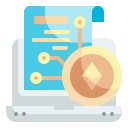Web3 Development
Web3 Development brings the next generation of the internet to life by integrating decentralized technologies, blockchain-powered applications, and trustless systems. It focuses on building digital products that give users true ownership, transparency, and security while unlocking new possibilities through smart contracts, tokenization, and decentralized storage. From decentralized apps (dApps) to full-scale blockchain ecosystems, Web3 development creates future-ready solutions that eliminate intermediaries and empower users with full control over their digital assets. With scalable architecture, secure protocols, and seamless integration of on-chain and off-chain components, Web3 Development enables businesses to innovate with confidence and deliver next-level user experiences in a decentralized world.


Empowering the Next Digital Era with Web3 Development
Web3 Development is redefining how digital systems are built, operated, and experienced. By leveraging decentralized blockchain networks, smart contracts, and token-based ecosystems, Web3 enables a new era of transparency, trust, and user ownership. Businesses can create powerful decentralized applications (dApps), automate processes through secure smart contracts, and build digital economies that operate without intermediaries. With a focus on scalability, security, and interoperability, Web3 Development helps organizations unlock innovative possibilities—whether launching NFTs, integrating crypto payments, developing DeFi platforms, or building full-fledged decentralized ecosystems.
Enterprise Web3 Solutions – Secure, Decentralized, and Future-Ready
Enterprise Web3 Solutions empower organizations to transition into a decentralized digital ecosystem with unmatched security, transparency, and operational efficiency. By leveraging blockchain networks, smart contracts, and decentralized applications, businesses can modernize their infrastructure, automate mission-critical processes, and build trust-driven systems without relying on intermediaries. These solutions are designed with enterprise-grade scalability, ensuring seamless performance even under high transaction loads.

Custom dApp Development
Build scalable, secure, and feature-rich decentralized applications tailored to enterprise workflows, enabling automated and transparent operations.

Smart Contract Design & Automation
Create secure, audited smart contracts to automate business processes, eliminate intermediaries, and ensure tamper-proof execution.

Blockchain Integration for Existing Systems
Seamlessly integrate blockchain layers with your current enterprise software (ERP, CRM, finance tools) for enhanced transparency and traceability.

Enterprise Tokenization Solutions
Tokenize assets, memberships, digital collectibles, and internal assets to unlock new value streams and enable secure digital ownership.

Private & Permissioned Blockchain Networks
Deploy enterprise-grade private or consortium blockchain networks with advanced access control, governance, and compliance frameworks.

Decentralized Identity & Access Management (DID)
Implement secure, user-controlled identity solutions that reduce fraud, improve data privacy, and streamline authentication across systems.
Transforming Digital Experiences Through Decentralized Web3 Technology
Web3 technology is reshaping how users interact with digital platforms by enabling secure, decentralized, and transparent ecosystems. Through blockchain, smart contracts, and tokenized assets, businesses can create trust-driven digital experiences with full user ownership. This transformation reduces reliance on intermediaries, enhances privacy, and increases operational efficiency.
From dApps to decentralized identity systems, Web3 empowers enterprises to build future-ready, user-centric digital solutions.

Building the Future of the Internet with Web3 Development
Web3 Development is pioneering a new era of the internet built on decentralization, transparency, and true digital ownership. By leveraging blockchain networks, smart contracts, and tokenized ecosystems, it enables trustless and secure digital interactions. Businesses can create dApps, automate workflows, and build innovative platforms without relying on centralized intermediaries. This next-generation infrastructure ensures stronger security, improved data privacy, and seamless interoperability across systems. Web3 empowers users with full control over their assets and identities, redefining how digital experiences are shaped. Together, these advancements create a future-ready internet that is open, scalable, and driven by community-powered innovation.
FAQ
What is Web3 Development and how does it differ from traditional web development?
Web3 Development focuses on creating decentralized applications that run on blockchain networks rather than centralized servers. Unlike traditional web development, Web3 emphasizes user ownership, transparency, and trustless interactions. Data is stored immutably on-chain, reducing reliance on third parties. This shift empowers users with control over their digital assets and identities.
It represents a more open, secure, and community-driven internet model.
What types of applications can be built using Web3 technologies?
Web3 enables the creation of decentralized applications (dApps) across finance, identity, gaming, supply chain, and more. Businesses can build DeFi platforms, NFT marketplaces, DAO systems, decentralized identity solutions, and tokenized ecosystems. Smart contracts allow automation of complex workflows without intermediaries. It also supports decentralized storage, token-based platforms, and cross-chain applications. Overall, Web3 unlocks highly secure, transparent, and user-centric digital products.
How secure are Web3 platforms compared to centralized systems?
Web3 platforms are inherently more secure due to blockchain’s immutable and decentralized structure.
Data is distributed across nodes, making it resistant to hacking, tampering, or unauthorized modifications.
Smart contracts ensure transparent, verifiable execution of rules and processes. There is no single point of failure, reducing risks seen in centralized systems. However, proper audits and secure architecture remain essential for maximum protection.
Can Web3 solutions integrate with existing enterprise software?
Yes, Web3 solutions can be seamlessly integrated with enterprise systems like ERP, CRM, and financial tools. APIs, hybrid architectures, and middleware allow on-chain data to sync with traditional infrastructure. This enables businesses to maintain their current workflows while enhancing transparency and automation. Blockchain layers can be added without replacing legacy systems.
Such integrations ensure smooth adoption and minimize operational disruption.
What role do smart contracts play in Web3 Development?
Smart contracts are the core of Web3 Development, automating digital agreements and processes.
They execute predefined rules without intermediaries, ensuring accuracy, speed, and trustless interactions. Smart contracts reduce human error and operational costs by enforcing transparency.
They power dApps, DeFi systems, token transfers, governance, and asset ownership. Overall, they enable secure, efficient, and reliable automation across decentralized systems.
How scalable are decentralized applications for enterprise use?
Modern Web3 frameworks offer improved scalability through layer-2 solutions, sidechains, and high-performance blockchains. These technologies allow thousands of transactions per second with low fees.
Enterprises can deploy hybrid or permissioned networks to handle large workloads. Optimized architecture ensures smoother performance even during heavy usage. With proper infrastructure, dApps can operate at enterprise-grade scale.
What industries can benefit most from Web3 technologies?
Web3 brings value to finance, supply chain, healthcare, real estate, gaming, insurance, and digital commerce. Industries needing transparency, security, and automation benefit the most. Tokenized ownership and decentralized identity systems further expand its applications. Web3 also enhances data integrity and user control across platforms. Its decentralized nature supports innovation across both emerging and traditional sectors.

